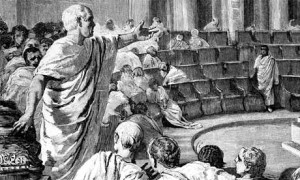Were there two Roman Senates at the same time?
 Chris asks if the Roman Senate moved with the capital to Constantinople.
Chris asks if the Roman Senate moved with the capital to Constantinople.
Constantine wanted his city to copy Rome in nearly every respect. Rome had 7 hills so Constantinople would too- even if it took some creative counting to reach seven on the Bosporus. He naturally intended for a Senate as well- not to replace the Roman one but to mirror it. But despite Constantine’s best effort, Constantinople’s version of the Senate was much less respected and originally functioned as a kind of city magistrate. As the importance of the city grew so did its Senate’s prestige.
Although power shifted decisively east in the 4th and 5th centuries, the two bodies- Roman and Constantinopolitan- existed side by side for a surprisingly long time. In the West the Senate outlasted the empire by several centuries. They continued to meet and pass legislation (mostly pertaining to city affairs) after the last emperor was put out to pasture in 476. Theodoric consulted them when he took possession of the city and Justinian officially restored some of their ancient privileges in the sixth century. There are records of them acclaiming eastern emperors until the seventh century and although they probably stopped meeting as a group sometime after that, senatorial families were still powerful in Medieval Italy. (The Orsini family for example claimed to be descended from the Julio-Claudians- a member of their clan was raised to the papal throne as late as the 18th century)
In the East, the Senate remained as a functioning body until the 13th century. Their last recorded act was raising the unfortunate Nicholaus Kanabus as emperor during the 4th Crusade. Their power had been declining for centuries (as detailed here) and their titles were empty, but there were Senators defending Constantinople’s walls on the morning of May 29, 1453.
I wonder how much the old senatorial families circled the papacy as it began to fill some of the power vacuum left by the Western Empire in the Middle Ages? I wonder what role they served as pope-makers… surely the old elite would have had a fair amount of sway over who was the next pontiff.
Now that is an interesting question. The old Roman senatorial families remained pagan long after the rest of the empire was explicitly Christian. But as the office grew they must have had strong influence. There are quite a few aristocrats in the list of Popes (Leo I, Hadrian I, etc) but the first definite example of patrician meddling I can find is in 366 during the reign of Constantius II. Pope Liberius died that year and the city of Rome was divided over his successor. The nobility favored Damascus I while the plebeian candidate was Ursicinus I. In the rioting that followed Ursicinus was able to crown himself and rule for a few months, but was eventually driven out of the city and banished. I wonder just how many times that scenario was repeated minus the bloodshed…
366, that is very interesting.
Alexander Hislop made the connection between the papal mitre and Dagon the fish god (I must admit the mitre with it’s lappets does look kind of fish-esque). I can’t comment of the strength of the connection between a Levantine god and the papacy, but I do wonder how far did those pagan senators manage to stick their fingers in?
Were they even able to shoehorn some pagan symbolism/doctrine in, while pulling the strings?
If the old [presumably still] pagans were meddling as early as 366, I found it highly doubtful they would have all ‘seen the light’ by then and embraced state-authorised Christianity wholeheartedly.
They might have, publicly. Who knows whether they were still reading entrails at home.
It does look kind of fish-like, but I think Hislop is a bit too rabidly anti-Catholic to be taken seriously in this instance. If he could have had the early popes eating children he would have. I think it’s a good bet that there were many converts who were Christian only publicly- after Constantine made the church an avenue for political advancement that was inevitable. I tend to think that the pagans probably had more impact on the symbolism than the theology of the papacy. An exception is the title Pontifex Maximus which is a holdover from the old Etruscan religion. It literally means ‘great bridge builder’ because the chief priest acted as a bridge between the gods and man. The Popes adopted the title along with the gradual idea that he was the dispenser of divine law. Perhaps that’s the origin of the doctrine of papal infallibility.
“I tend to think that the pagans probably had more impact on the symbolism than the theology of the papacy.”
That would make sense, as [at least in my admittedly limited opinion] there isn’t much to recommend Roman paganism; official Christianity seemed to be far more useful as a social tool – and any good p0litician, or senator, knows which way the wind is blowing.
By the way, thanks for your podcast series, and I really enjoyed Lost To The West (I plan to start listening to the Norman Centuries soon). Keep up the good work in making history accessible to us enthusiastic amateurs.
Thanks for reading/listening and the engaging commentary!
My pleasure!